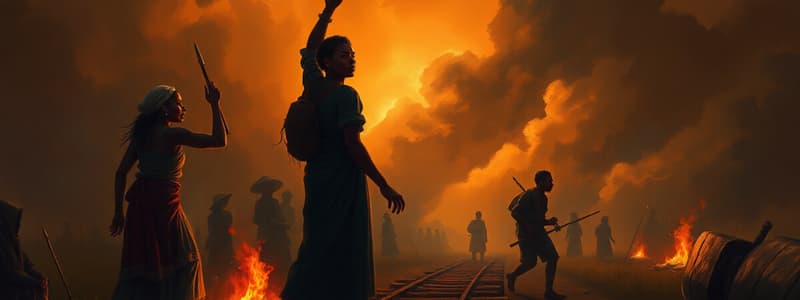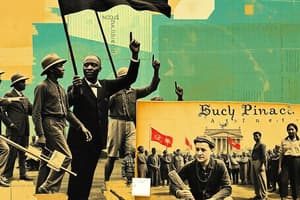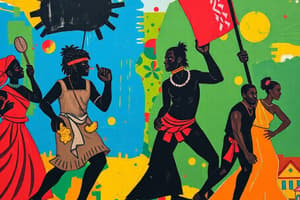Podcast
Questions and Answers
What was the primary objective of slaves' individual acts of resistance on plantations?
What was the primary objective of slaves' individual acts of resistance on plantations?
- To distract from routine plantation work (correct)
- To organize a revolt against the masters
- To communicate with abolitionists
- To escape to the North
Which of the following best describes the common goal of most runaway slaves?
Which of the following best describes the common goal of most runaway slaves?
- To join organized revolts
- To seek asylum in other countries
- To establish independence in the North
- To find family members sold to other planters (correct)
Why were there fewer violent slave revolts in the United States compared to the Caribbean and Brazil?
Why were there fewer violent slave revolts in the United States compared to the Caribbean and Brazil?
- There was less discontent among slaves
- Demographic dynamics favored white control (correct)
- Slave populations were larger in the U.S.
- Slaves lacked access to weapons
What was a significant factor that worked against violent response to slavery among U.S. slaves?
What was a significant factor that worked against violent response to slavery among U.S. slaves?
What role did the underground railroad play concerning runaway slaves?
What role did the underground railroad play concerning runaway slaves?
Which slave plot aimed to capture the governor of Virginia?
Which slave plot aimed to capture the governor of Virginia?
What was a common form of non-violent resistance displayed by slaves?
What was a common form of non-violent resistance displayed by slaves?
What kept some slaves from successfully escaping permanently?
What kept some slaves from successfully escaping permanently?
Which event involved a conspiracy to seize control of Charleston?
Which event involved a conspiracy to seize control of Charleston?
How did some slaves communicate grievances regarding their treatment?
How did some slaves communicate grievances regarding their treatment?
What strategy did apologists use to justify slavery in lieu of economic arguments?
What strategy did apologists use to justify slavery in lieu of economic arguments?
What was one of the most absurd defenses of slavery according to the text?
What was one of the most absurd defenses of slavery according to the text?
How did advocates of slavery compare the conditions of southern slaves to northern wage workers?
How did advocates of slavery compare the conditions of southern slaves to northern wage workers?
Which major religious groups in the South split over the slavery issue?
Which major religious groups in the South split over the slavery issue?
What was the fundamental belief underlying the proponents’ arguments for slavery?
What was the fundamental belief underlying the proponents’ arguments for slavery?
What action did the South Carolina legislature take in 1835 regarding antislavery publications?
What action did the South Carolina legislature take in 1835 regarding antislavery publications?
What marked the effective end of public discussions on slavery in the South after 1832?
What marked the effective end of public discussions on slavery in the South after 1832?
What misconception about slave owners was held by proponents of slavery?
What misconception about slave owners was held by proponents of slavery?
What was considered the most visible difference between the North and the South?
What was considered the most visible difference between the North and the South?
What was the primary objective of Nat Turner's revolt in Virginia?
What was the primary objective of Nat Turner's revolt in Virginia?
What tactic did Nat Turner initially choose regarding support from other slaves?
What tactic did Nat Turner initially choose regarding support from other slaves?
What was the response of the Virginia state legislature to Turner's revolt in early 1832?
What was the response of the Virginia state legislature to Turner's revolt in early 1832?
What did Turner's revolt ultimately convince many Virginians to reconsider?
What did Turner's revolt ultimately convince many Virginians to reconsider?
Which measures were enacted in response to concerns raised by Turner's revolt?
Which measures were enacted in response to concerns raised by Turner's revolt?
What severe actions were taken against alleged conspirators during and after Turner's rebellion?
What severe actions were taken against alleged conspirators during and after Turner's rebellion?
What significant shift occurred in Virginia following an open debate about slavery prompted by Turner's revolt?
What significant shift occurred in Virginia following an open debate about slavery prompted by Turner's revolt?
What was one outcome of Nat Turner's revolt concerning the slave population in Virginia?
What was one outcome of Nat Turner's revolt concerning the slave population in Virginia?
Who was David Walker, and what was his significant contribution to the abolition movement?
Who was David Walker, and what was his significant contribution to the abolition movement?
How did the economies of the North and South compare in terms of infrastructure before the Civil War?
How did the economies of the North and South compare in terms of infrastructure before the Civil War?
What was a significant barrier to reform movements in the South before the Civil War?
What was a significant barrier to reform movements in the South before the Civil War?
What was the primary educational focus in the Southern states during this period?
What was the primary educational focus in the Southern states during this period?
What was the general attitude towards extending rights to African Americans in the North?
What was the general attitude towards extending rights to African Americans in the North?
What common belief did both Northerners and Southerners share regarding democracy during this period?
What common belief did both Northerners and Southerners share regarding democracy during this period?
What was a significant factor that contributed to increased sectionalism before the Civil War?
What was a significant factor that contributed to increased sectionalism before the Civil War?
Which of the following best describes the educational priorities in the South during the years leading up to the Civil War?
Which of the following best describes the educational priorities in the South during the years leading up to the Civil War?
What was a major consequence of the Westward movement undertaken by both Northerners and Southerners?
What was a major consequence of the Westward movement undertaken by both Northerners and Southerners?
Prior to the Civil War, how did Southern society view abolitionism?
Prior to the Civil War, how did Southern society view abolitionism?
Which statement reflects the view of democracy in both the North and South before the Civil War?
Which statement reflects the view of democracy in both the North and South before the Civil War?
Flashcards are hidden until you start studying
Study Notes
Resistance to Slavery
- Slaves resisted slavery through individual acts of sabotage: pretending to be ill, refusing to work, performing tasks poorly, destroying equipment, setting fires, and stealing food.
- Slaves also resisted by running away, although few were successful for long periods.
- The Underground Railroad, a system of safe houses organized by abolitionists and run by former slaves like Harriet Tubman, helped only about a thousand slaves reach the North.
- Most runaways aimed to find family members who had been sold to other plantations.
Slave Revolts
- The United States had fewer slave revolts than other parts of the Western Hemisphere, likely due to demographic differences: a smaller proportion of slaves compared to white masters in most US states.
- Notable slave revolt plots included Gabriel Prosser's plan to attack Richmond, Virginia in 1800 and Denmark Vesey's scheme to seize Charleston in 1822. Both were betrayed by fellow slaves.
- Nat Turner's 1831 Virginia revolt, motivated by religious visions, resulted in the deaths of around 55 white people, primarily women and children. Turner was eventually captured and executed.
The Debate Over Slavery in Virginia
- Nat Turner's revolt spurred discussions about ending slavery in Virginia, with some proposing gradual emancipation with compensation for slave owners.
- The proposed measure failed, but the debate highlighted the growing division over slavery within the state.
- Following the failed emancipation proposal, Virginia and other Southern states implemented stricter slave codes, increasing patrols to track runaways, limiting African Americans' freedoms, and prohibiting slave education.
Defense of Slavery
- Southern apologists for slavery turned to the Bible and history to defend the institution, citing examples of slavery in ancient civilizations and biblical references.
- Slavery proponents argued that slaves were happy and content under the paternal care of their masters and that slaves were better off than Northern factory workers.
- These arguments were often based on racial superiority beliefs.
North Versus South
- The North and South developed increasingly divergent economies, with the North embracing industrialization while the South remained primarily agricultural.
- The South's support for slavery and its resistance to social change hindered the adoption of reform movements seen in the North.
- The issue of slavery's expansion into new territories became a major point of conflict between the two regions, tightening the sectional lines dividing the nation.
Studying That Suits You
Use AI to generate personalized quizzes and flashcards to suit your learning preferences.




